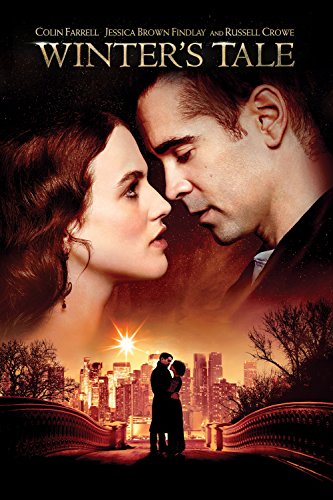
![]() Winter’s Tale by Akiva Goldsman
Winter’s Tale by Akiva Goldsman
I made a point of watching Akiva Goldsman’s Winter’s Tale AFTER reading the book upon which it’s based, knowing that stories are usually considered better on the page than as filmic adaptations. But having completed Mark Helprin‘s novel of the same name, I was left pretty bewildered as to how on earth the transition from book to screen would take place.
The trailers would have you believe that Winter’s Tale is a bittersweet time-travelling love story (perhaps a more fairytale-esque version of The Time Traveller’s Wife), though I suspect any romance-loving reader who tracks down the book on the basis of this film will be utterly baffled by what it has to offer. Suffice to say that the book and the film are only tangentially related, sharing a few character names, a couple of plot scenarios and the basic gist of two lovers separated by death and time (though in the book, Peter and Beverly’s love story only takes up about 10% of the page count).
Adapting the book in its entirety would have been utterly impossible, and so Goldsman spins his own tale out of a selection of Helprin’s ideas, ending up with something that’s rather like Love Story meets Paradise Lost. As it happens, the film inserts a fleshed-out backstory for one of its villains, something that is only ever-so-vaguely hinted at in the book, changing the entire narrative into a romance set against a backdrop of warring demons and angels.
It’s 1916 and Peter Lake (Colin Farrell) is an Irish thief on the run from his old employer Pearly Soames (Russell Crowe) who seems to have a vested interest in vengeance that goes beyond punishing his runaway protégé. When a mysterious white horse comes to Peter’s rescue, he decides to steal what he needs from a row of Upper West Side mansions and get out of New York for a while.
Beverly Penn (Jessica Findlay Brown, best known as Lady Sybil on Downton Abbey) is a beautiful young woman dying of consumption. She’s alone in the house when Peter breaks in, but after an unorthodox meet-cute, the two of them realize their mutual attraction. A tentative romance blossoms, but Pearly is incensed at their connection, certain that it foreshadows an impending miracle — something that he’s determined to prevent.
There are some trite elements (Beverly’s interminable voice-overs) and some rather inexplicable bits (Will Smith as Lucifer!) but I found myself enjoying it despite its undeniable unevenness. The visuals are beautiful, with vistas of snowy parks and ice-covered lakes, as well as a cast that manage to keep straight faces throughout some awkward exposition and wonky CGI winged horses. Jessica Findlay Brown in particular is simply gorgeous — if anyone was ever going to fall in love at first sight, it would most probably be with her.
Critics totally panned this film, but I suspect it may find a second life on DVD. Despite its strangeness, there is a sincerity and beauty to it that is best enjoyed curled up on the sofa with a hot drink and/or a crackling fire. It’s sweet and winsome and a little ridiculous at times, but honestly? I liked it.




A truly magical book…I couldn’t imagine any film capturing its sublime atmosphere….
It’s interesting you liked the film better than the majority of critics who panned it, but I definitely want to try the book more. They sound like completely separate works in any case.
Definitely completely separate works. If it wasn’t for the title and a few little snippets here and there, you would have no idea book and film were even related!